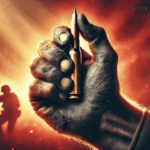The phrase "bite the bullet" means to face unavoidable challenges with courage. It is believed to have originated from historical battlefield surgeries, where soldiers had to literally bite down on bullets to endure pain without anesthesia. Today, the expression serves as a metaphor for confronting difficult tasks, whether personal or professional. For example, one might "bite the bullet" when scheduling a intimidating dentist appointment or having a tough conversation. This phrase remains relevant, capturing the essence of resilience in modern life. Understanding its roots can enhance appreciation for its ongoing significance, revealing much more about human perseverance.
Synonyms
When faced with challenging situations, individuals often seek phrases that convey the essence of enduring hardship with fortitude. Several synonyms encapsulate the concept of courageous endurance while facing adversity, reflecting a blend of strength and resilience. Here are some notable alternatives:
- Face the music
- Take the plunge
- Grin and bear it
- Steady oneself
- Buck up
These phrases serve not only as linguistic equivalents but also highlight a cultural acceptance of grappling with discomfort. However, it is imperative to critically assess the contexts in which these expressions are used. While they promote bravery in adversity, reliance on such phrases can sometimes mask the necessity for direct action or broader discussions around the underlying challenges. Ultimately, understanding their usage can lead to more effective communication during life's trials.
Example of Sentences
Facing difficult situations often requires individuals to embrace the challenge with resolve. To illustrate the concept of "bite the bullet," consider the following example sentences that reflect the essence of enduring painful experiences through courageous acts:
- Despite fear of the dentist, she managed to schedule an appointment.
- After months of hesitation, he finally initiated a difficult conversation with his boss.
- The team decided to lay off employees, knowing it was necessary for long-term stability.
- Despite her anxiety, she faced an upcoming surgery with determination.
- After years of neglecting his health, he began a rigorous workout plan.
Each of these instances showcases how individuals confront discomfort and take necessary action, often transforming painful experiences into avenues for growth.
Origin
The phrase "bite the bullet" has its roots in historical contexts that underscore resilience in the face of pain. Primarily associated with military origins, the term is believed to have stemmed from battlefield surgeries conducted without anesthesia, where soldiers would bite on a bullet or other object to endure immense pain. This act was more than mere practicality; it served a symbolic interpretation of courage amidst adversity. Curious enough, the phrase has evolved, becoming a metaphor for tackling difficult tasks despite fear or reluctance. While the literal act may be exaggerated, its underlying message of perseverance resonates strongly, encouraging individuals to confront uncomfortable situations with determination. Understanding these origins enriches our appreciation of the phrase's enduring relevance in contemporary language.
Collocations
Collocations related to the phrase "bite the bullet" enhance its expressive power and contextual understanding. When addressing painful situations and enduring hardship, specific phrases further clarify the sentiment behind this idiom.
- Bite the bullet and move on: Emphasizes the necessity of progression despite difficulties.
- Bite the bullet to face reality: Highlights acceptance of unpleasant truths.
- Bite the bullet during challenges: Focuses on resilience in adverse circumstances.
- Bite the bullet in tough times: Suggests facing seemingly insurmountable obstacles with courage.
- Bite the bullet when necessary: Reinforces the idea that enduring hardship is sometimes essential.
These collocations can effectively convey the complex emotions associated with overcoming obstacles, prompting deeper reflection on the nature of our responses to adversity.
How to Use in Everyday Language
Incorporating the phrase "bite the bullet" into everyday language can convey a strong sense of resilience and determination when discussing challenging situations. This phrase finds practical applications in various everyday scenarios, allowing individuals to express the necessity of facing difficult tasks. For instance, one might say, "I need to bite the bullet and start that challenging project," demonstrating commitment despite hesitation. Additionally, when discussing personal matters, such as confronting a friend about a sensitive issue, using this phrase can underline the importance of honesty and courage. By adopting this expression, communication can resonate more powerfully, illustrating not just the push to endure but also a willingness to embrace the inevitable struggles that accompany significant decision-making.
Why Is It Still Relevant Today?
Using the phrase "bite the bullet" continues to resonate in contemporary discourse due to its succinct encapsulation of resilience in the face of adversity. Its cultural significance lies in its ability to portray a mindset of confronting uncomfortable realities, something many encounter in today's fast-paced world. In modern applications, from personal challenges to professional dilemmas, people frequently invoke this phrase to inspire tenacity and determination. However, while the phrase captures an essential truth of human experience, one must also question whether it sometimes encourages avoidance of necessary self-care. Consequently, "bite the bullet" remains pertinent, reminding us to tackle issues head-on, yet it invites critical reflection on the balance between perseverance and well-being in our lives.







